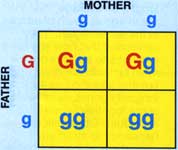padib said:
lestatdark said:
padib said:
lestatdark said:
padib said:
What in our genes dictates that at 150 (barring out all other factors from the equation), at 150-200 years there is a complete loss of capacities of DNA repair? Is it a gene? Enlighten me.
This may be something you laugh at, but it provides explanations, which is something I understand to be encouraged in the elaboration of theories:
http://www.creationworldview.org/articles_view.asp?id=45
EDIT: I found this link more informative: http://creation.com/living-for-900-years
|
|
Okay, I just carefully read your post and of course I need to do some thinking. But the second link I provided resonates with what you're saying I don't see how even it is not science. Please do me a favor and tell me what part of this link you find unscientific.
http://creation.com/living-for-900-years
The article clearly says that the genetic coding of Telomeres is only part, albeit a big one, only part of the story. "So it looks as if some pre-programmed genetic limit, while not all there is to aging, could well be a big part of the story."
I'm certain they have thought about all the other things you describe, but it would take them "pages" to explain. Keep in mind these articles are for lay-people, so you don't judge the authors of the articles because the texts lack detail. You would judge the authors after e-mailing questions to them and reading their answers, that would be more fair.
As smart as some of you are, I'm sick of hearing you all jump the gun and calling these people pseudo-scientists everytime I bring up an article. Realize, again, that they are writing to laymen and can't burden the article with all the details involved. If needed they'll create another article to address the other processes you described.
But to help, could you list the main names of the processes you described in bullets? It's hard for me to synthesize your post.
Also thanks for taking the time to take all that information and making it easy to understand (for a non-biologist).
|
Let me deconstruct what's so unscientific in that link.
First - The assumption that there were human beings that lived over the theoretical limit of 150-200 years. Other than what's written in that ancient text which has no accountability nor scientific value, there's also no data, either fossilized nor C-14 dated skeletal data suggesting that in any point of the Homo Sapiens line there have been individuals with so much as close as to the theoretical limit. As you know, Carbon atoms degenerate in a strictly determined half-life span which can be used to date anything accurately if there's presence of C-14 isotopes in the sample. If any scientist worthy of his title uses the bible as any kind of data then his/her whole theory might as well go down the drain.
Second - There's not an average upper limited "programmed" for each species, that's quite frankly a very ridicule thing to say. Each different species has a varied number of chromossomes and a varied number of pair bases, meaning a varied genome. Humans aren't not nearly the ones with the largest genome nor the ones with the largest number of protein-coding genes, actually we're quite limited in the gene variation pool (hence we having one of the biggest cancer incidences of any species).
Each species has the telomere size in accordance to how much DNA it has to protect, how many divisions a cell must make or how functional a chromossome has to be (for example humans have 46 chromossomes as I said, and most of them are constitutively inactive during the majority of a person's life, so those chromossomes need to have a larger amount of telomores on their extremities to avoid any kind of damage during replication, as there's almost no proof-reading from the DNA polymerase on them.
Third - Loss of length of the telomere. That explanation (and the subsquent phrases which are not only unscientifc but also completely pointless in any kind of scientific discussion) is as flawed as it can be. Telomere length is constantly decreasing since the formation of the embrion. Each division shortens the telomeres a bit more, since the telomerase enzyme functions in a negative feedback loop (when the telomere reaches a certain length, the expression of telomerase is switched off and the telomere growth stops there). Initial telomere length hasn't varied in any kind of significative number since the first Homo Sapiens fossils were studied (for example, Mitochondrial Eve, the woman to which every person's mitochondria can be traced to had similar telomere length as any human nowadays. Since Mitochondrial Eve has been estimated to live 200.000 years ago, that alone is enough to ridicule the explanation on the link). Again, hard scientific data is more solid, valuable and reliable than any account of an unscientific book.
Fourth - The writter also uses the roles of dominant and repressed genes as an explanation of why some of the "longeviy" genes dissapeared via inheritance. Won't go explaining this to anyone, since dominance and repression is common 10th year biology knowledge, so any teenager can explain how ridiculous this part is. If Mendell was alive he would probably laugh veemently at it as well. Genes don't "dissapear" just because they weren't inherited when the embrio is formed, they simply are not expressed since other genes which have a function similar to those have a large % of dominance over them, thus the less dominant genes are repressed. Otherwise we would never have blue/green irises since their expression is only possible when the gene that codes for black/brown irises aren't dominant or co-dominant (dominant is when you have BB and co-dominant is when you have Bb expressions. Repressive expression can only be obtained when there's no B in the expression pair)
Fifth - The fruit flies and nematods (they're a different clade than the typical "worm", another error in the text) experiments were based mostly on different metabolical outputs rather than genetical manipulation. Drosophila Dranger are known for a fast response to external stimuli in their DNA, adapting rather quickly to almost any kind of signal you give them (also their genome is easily manipulated via gene therapies as it's a pretty short genome with a limited number of functional-genes), such is the case with the majority of species of nematods. If you change the metabolical conditions in a way that you slow down, to a large degree, the fruit fly adapts their tissues to increment the period between cellular divisions and use less amount of nutrients for protein expression and oxidative respiration, thus you "augment" their lifespan considerably.
The major problem is that most species don't have that capacity of extreme metabolical adaptation that fruit flies have, so those changes are usually lethal. Metabolical changes of such degree are only viable in mammal species such as ours if they're done in a large time-span (in the number of generations) and we know that our metabolical processes haven't changed that much since the early Homo Sapiens.
There are some other errors that I could point out as well, but I figure that's about enough. Next time, provide an article that offers actual scientific data and uses proper knowledge about the subject instead of conjectures and manipulation of information to suit their views and outlooks, which is exactly what that site does.
|
1- I didn't know C-14 could calculate the age of individuals. (Don't take this as a naive concession, I know it doesn't) C-14 dates a life-form over long periods of time, not their actual ages (in the hundreds of years). I don't see how C-14 has any relevance to the age (longevity) of individual specimens. No matter the scientific language you use, it doesn't make your post more sensical. Either your point is irrelevant, or you need to explain because I fail to see how it is relevant. As for his title and worthiness, some people don't consider C-14 as accurate as you do, and for good reason. Radiometric dating assumes that no global catastrophe ever occured within the measured timeframe. Not only is that highly unlikely, but most creation scientists have support for the global flood (on another topic). He is worthy of his title no matter your bias.
C-14 dating cannot be used to determine an individual's age, but you can do aproximated estimatives via how much carbon is deposited in the calcite formations in the fossilized bone. That's how you can estimate how much a certain fossilized specimen lived. C-14 might not be completely accurate but it is the most accurate reading currently available, since it's the most common isotope in all living beings. Usually those who from in the use of C-14 dating are the ones that want the data to fit the theory and not the other way around, just as that link is showing.
2- But is he right to say that, despite being dependent on other factors such as gene volume and replication parameters, in relation to those factors the telomere count is coded in the DNA? Other wise, what says telomere count = 5*(x+y) or some equation like that, where x is the gene volume and y is a replication parameter. You're convoluting the argument, but in the end, despite clarifying things, you're not removing to his main point, that the telomere count is, ultimately, dictated by the human genetic code. So I find your position rediculous because, despite your depth of knowledge, your bias ("this guy is not a legitimate scientist) stops you from thinking outside the box.
First and foremost, don't ever talk about bias again, since you're the one who started posting with a bias. I merely pointed out inaccuracies that wouldn't pass in any kind of scientific debate or peer review in my field. So unless you and the author are held to any other kind of standard peer review in genetics, don't ever use that word. I have no qualms against creationism nor do I have any qualms against any other religious view. I just disapprove veehemently when religion twists and shaped data to fit their own theories, no matter how convoluted it is.
That being said, what does using telomere count has anything to do with it being tied to longevity. The formula he gives isn't even a constant formula within every cell of our own body, much less in other species. Cells like the neural cells have fixed values of telomeres which differ from cells within our liver or any other tissue or organ mainly because neural cells don't divide or divide much less than the rest. That's genetics 1-0-1, you cannot make a generalized assumption and then use that example as if it is the general rule.
So no, telomere longevity isn't the main reason to any kind of longevity, because it depends on a large amount of factors as well.
3.
"Mitochondrial Eve, the woman to which every person's mitochondria can be traced to had similar telomere length as any human nowadays." Source pls.
I'll link something even better, conservation of telomere length and similar sequence amongst verterbraes, which is the main discussion point when it comes to telomere conservation: http://www.ncbi.nlm.nih.gov/pmc/articles/PMC297991/pdf/pnas00285-0228.pdf.
Our telomere sequence is the same in length and type as the majority of vertebraes and have remarkable similarities to protozoan telomeres.
" Again, hard scientific data is more solid, valuable and reliable than any account of an unscientific book." I think I've had quite enough of these blanket statements. The guy is using the same science as you, the same facts, the same processes. He's trying to see how the biblical account could fit them. I've really had quite enough of these.
He's not using the same science as me, he's merely taking studies out of order and trying to find correlations between in all the wrong ways. I do similar studies quite often, given that my field of expertise is on molecular genetics and i'm currently working on DNA repair systems. Plus, again, you don't fit the data to the theory, you fit the theory to the data. That's the correct, scientific and ethical way to procede. When you fit data to a theory, whatever it may be, you're corrupting and bending the data to suit your needs and that is utterly reprochable.
4. Your point is completely irrelevant to what he was describing. Capital G was the gene that could be repressed. But in half the genes, given it was only on one of the Father's Chromosomes, in half the possible permutations the gene was inexistent. In half the genes it was there, but could be dominant or recessive, depending on whether the trait emerges or not (after the fact). In his scenario, there were 2 options: either the gene was out, or it was half-way in. Dominance or recession of this gene is completely, again, completely irrelevant to his point.
He made a beginner's mistake. You don't confuse dominance with autossomal inheritance, both are completely different things. If he tried to explain that there are some autossomal genes in the X chromossome that due to point mutations or even allelic fingerprinting were metilated and thus their characterization and expression were stopped then he might have had a point.
As he pointed out, even if capital G was repressed even in one of the father's chromossomes, the capital G genes would still be in the genome. The human genome is redudant, there are a various number of copies of the same gene in our genome in both allelic redudancy and chromossomical redudancy, so even if a copy of the capital G gene was taken out of the permutation equation, that would still leave the copies of the capital G intact only not expressed.
In the scenario he described the capital G repressed gene would have been expressed in at least one other individual since the "biblical" times strictly out of statistical models.
If he did tried to explain via the autossomic way, that would create another set of problems, since if you had an allelic autossomic capital G gene being expressed previously, that allele comprised of both the father and the mother's inherited genes, thus if that allele was simply switched off, it would have had to happen in both father and mother at the same time on the same embrio. That would create a whole shitload of problems for the embrio so that scenario is highly unlikely.

5- Though the breeding causes a change in the metabolism, the change is done from the genetic level which dictates said metabolism. So ultimately regardless of the expression of the genetic change and as to the why, the change is genetic, which was his central point. You play with the argument, but you're not contradicting his claim. Moreover, his scenario of degradation of age given the biblical age graph covers a period of 600 years, and that's only the drastic degradation. The general curve extends over 2000 years.
2000 years is nothing in genetical terms. Our genetic pool hasn't changed that much since the colonization of Europe, since we're basically the same haplogroup. Heck we even have similar metabolical and cellular functions as the early Homo Sapiens, and let's not talk about DNA conservation as well (which works in the same fashion as telomere conservation) which already has a big effect even when comparing different species, much more when you're talking about the same species.
And genetics doesn't dictate metabolism. It's a feedback system in which both system have equal importance. Changes in metabolism imply changes in the genetical structure to adapt to that said metabolism and sudden changes in the genome can also have consequences on how our metabolism changes over the generational span.
I don't have to contradict his claim since he has no solid claim to begin with. It's missing some basic knowledge of how the genetical structure actually works and he uses simple examples as if they were THE functionalities of the genetical engine. That's all fun and nice for the lay-man but he's doing a poor job on instructing said lay-man, because when you go deeper into the intrinsic structure of how DNA expression and modifications are actually performed, more his "theory" gets thrown out the window. Like I said, the author forgets there's autossomical allelic inheritance, epigenetical factors in genetical expression, DNA fingerprinting, DNA footprinting, how vertical gene transfers work and the accounting of horizontal gene transfers within our genome (the adding of "junk" sequences from viruses) which can drastically affect expression.
The author might as well have given any of the aformentioned examples and say "Any of those accounts fit my data because the gene got to have dissapeared somewhere" when the question should really have been "Was this gene ever in our genome to begin with?"
I'm in no ways a biologist, nor a biology student, and given my above rebuttal there is much I can say to attack you personally, but I won't. I just want to show you things you say that I find offensive:
"Next time, provide an article that offers actual scientific data and uses proper knowledge about the subject instead of conjectures and manipulation of information to suit their views and outlooks, which is exactly what that site does."
"If any scientist worthy of his title uses the bible as any kind of data then his/her whole theory might as well go down the drain."
"And yeah, I did do a quick view on your links. If that's considered science within some circles, then I dread to be with those so called "scientists"."
"Even my 8 year old cousin is a better "scientist" than those people."
You might wonder why it bothers me to read these, well it is because:
1) These are the scientists I read regularly and they generally seem to make good sense.
2) Those who try to refute them are usually blinded by their self-righteous disdain for their work.
3) The fact that I listen to junk from the other camp and rarely do I complain, yet I have to constantly hear this bigotry, I find it a bad testament of your character.
I'm sorry you feel so offended by my phrases, but as I said, the author's work would never pass peer review in any kind of genetical debate. There's all kind of scientists in the world, just like there's all kind of people. I just have a big disdain for those scientists who manipulate data to fit their theory. They do a poor job not only for the scientific community, but also for the people whom they're trying to reach.
You find this to be a bigotry, but the article itself is scientifically bigoted as well. Also, you yourself were a bigot when you accused me of bias when I only gave you the actual concepts of genetics. I have no personal qualm against the author nor against the creationist views, I respect any and every religious point of view of the world, since I myself am a religious person.
My advice to you is to think twice before reading any kind of scientific article outside actual scientific circles (PubMed and NCBI) because most of the times, the data in those articles is twisted to fit the author's theories or views. You sharing the same views as the author doesn't make the article right just because you think that's right.
|































































